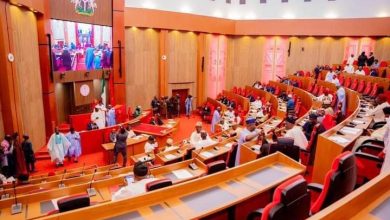The Legality or Otherwise of the FCT Minister’s Plan to Revoke Certificates of Occupancy For Non-Development of Lands by Holders in the FCT

By Ater, Solomon Vendaga
INTRODUCTION
Swiftly after his inauguration on the 21st of August 2023, the Minister of FCT, Chief Nyesome Wike, CON had his first address wherein he stated amongst other things in a very emphatic way that he will not be tired of revoking certificates of occupancy especially of those who have lands laying fallow and undeveloped in the FCT.
His statement has raised so much tension owing to his antecedents namely, his activities while he was governor of Rivers State. So many people have been apprehended by this statement and many other impending ‘dooms’ that sooner or later may befall them. In light of the foregoing, this piece is carefully prepared to address issues arising from the Minister’s statement and his subsequent actions.
These inter alia include the legality of his statement, what is certificate of occupancy, what distinguishes it from the right of occupancy and in terms of conflict which supersedes, under what circumstances can they be revoked as well as whether there is any right for the holder of the C of O at all? As the discussion in this work advances, we will consider all of the above. It should be noted that within the context of this work, Minister of FCT is interpreted to mean Governor also. So, where the Act applies to the Governor it does also apply to him (s. 51(2) of LUA).
THE CURRENT REGIME OF LAND ADMINISTRATION
To start with, the current regime of ownership of land in Nigeria is designed to suit the philosophy behind the Land Use Act, of 1978 which is land use. This differs greatly from the regime that operated before the law. Then, the owner of the land had absolute, allodial, maximal, total and unchallenged power and the right over the land to use it however he wanted. This title or regime of ownership only suits perfectly with the description given by the court in Abraham v Olorufemi (1991) 1 NWLR PT 165 at 53, he was the alpha and the omega as far as the land was concerned. The government would have to go through several processes which involve paying humongous compensation before getting lands for developmental purposes. To address this unfortunate incident, the government while creating the committee whose reports gave birth to the Act charged them amongst other things to examine steps necessary for controlling future land use and also opening and developing of new lands for the needs of the government and the Nigeria’s growing population in both urban and rural areas and make appropriate recommendations. At the end of the day, a new regime was developed- the Land Use Act. The objectives of the Act inter alia include encouraging development by laying down terms and conditions for the holder and providing compensation for unexhausted improvement only.
Thus, the current regime now vests ownership of lands in the government and the land is held in trust for the development and common good of all Nigerians. Vesting of Land in the Governor/Minister Accordingly, Section 1 of the LUA 1978, provides that, “All lands comprised in the territory of each state in the federation are hereby vested in the Governor of that state and such land shall be held in trust and administered for the use and common benefit of all Nigerians in accordance with the provisions of this Act.” For the FCT, the lands are now vested in the Federal Government and is administered by the President (s. 297(2) of the 1999 Constitution of the Federal Republic of Nigeria, s. 1(3) of FCT Act) who delegates the FCT Minister (He is appointed under s. 147(1) of the Constitution of the Federal Republic of Nigeria) to administer same on his behalf. This power of delegation is in s. 18 of the FCT Act. It is pari materiae with that under s. 45 of the LUA.
This implies that the Act has limited the rights of ownership of land in Nigeria. It thus, removed the radical title and created a proprietary interest in land which is known as the right of occupancy, which is currently, the absolute interest to land a person can be granted. This right of occupancy is limited in duration and defeasible under certain conditions. When granted by the Minister it is termed statutory right of occupancy (S. 5 of LUA) and when it is by the local government, it is customary right of occupancy (S. 6 of LUA). This could be expressed or deemed. It should be noted that under the current regime, the highest title available for an individual in the land is the right of occupancy. A sui generis kind of title that “is new in its form, not coming from within any form of right known to property law” (Omolola, 1984:15). As Prof. Abugu noted, the right of occupancy “…is meant to confer a docket of interest in land which is outside the contemplation of all previous methods of vesting interest in land for the purpose achieving the peculiar objectives of the Act” achieving the peculiar objectives of the Act” (Abugu, 2012:71).
• DISTINCTION BETWEEN CERTIFICATE OF OCCUPANCY (C of 0) AND RIGHT OF OCCUPANCY (R of 0).
There is a perennial confusion between a certificate of occupancy and a right of occupancy. They are regarded as one to many people. In fact, many, especially the financial institutions are in the culture of exhibiting high patronage for C of 0. This seemingly avoidable error has even been fallen into by the Court despite the obvious difference between the two (Abugu, 2012: 85). On the face of technicality, the right of occupancy is granted while the certificate of occupancy is issued. For all practical purposes, the C of O is only evidence of a grant and does not confer any title to land in question (Ogunleye v Oni (1990) LCN/2433 (SC)). What can be deducted from this is that while the right of occupancy can exist independently, a certificate of occupancy must necessarily be predicated on a pre- existing right of occupation (s. 9(1)(a) of LUA).
Thus, a right of occupation is a grant, the originator and the root of the right, interest or title to the land, a certificate of occupancy bears only an evidential value. Besides, there is nothing in s.9 of the Act that suggest that a certificate of occupancy must be acquired by the holder of right of occupancy. It is at his discretion. The C of O is just one of the five ways of proving title to land which are by traditional history, production of document of title, proof of acts of ownership, proof of acts of long and undisturbed adverse possession and proof of ownership of adjacent land. (Nkado v. Obiano (1997) 5 NWLR (pt. 503) 31, Chukwu v. Diala (1999) 8 NWLR (pt. 608) 674 CA, Adesanya v. Aderounmu (2000) 6 S.C. (pt. 1) 18, Nkwo v. Iboe (1998) 7 NWLR (pt. 558) 354 S.C.) Onu JSC summed up the evidential value of certificate of occupancy in the following words: A Certificate of Occupancy issued on the Land Use Act, it must be stressed, cannot be said to be conclusive evidence of any interest or valid title to land in favour of the grantee: it is only prima facie – evidence of such right, interest or title without more and may in appropriate cases be effectively challenged and rendered invalid, null and void… Consequently, where it is proved, as in this case, that another person other than the grantee of a certificate of occupancy had a better title to the land, the Court may have no option but to set aside the grant or discountenance it as invalid, defective or spurious as the case may be. (Adole v Gwar (2008) MJSC 38 at 54 par. F & G) Given the above, the C of O considered here is one that has been issued contemporaneously with the right of occupancy as its evidence.
Thus, the work is concerned with those who have the valid title to the land, a subject of the minister’s revocation. It is also important to note that to keep up with the tenor of the LUA which is the vesting of the land in the government (governor or minister), a grantee of a right of occupancy is bound to pay ground rents. Though it attracts revenue for the government, is essentially a constant reminder to all concerned that the governor or the government is the reigning overlord. This explains why the Act insists that rents must be nominal and not economic (Abugu, 2012: 81). Ground Rent refers to a tax imposed and administered by a State Government or the Federal Capital Territory (FCT) on land, whether it is developed or undeveloped, that has been granted by the state government. This tax obligation is mandatory for landholders and must be paid within a specified timeframe. Importantly, the computation of Ground Rent by the government remains unaffected by any enhancements, developments, or structures erected on the land. Additionally, it is within the authority of the State Governor to potentially reduce or even exempt Ground Rent for a specific piece of land, if it serves a broader public interest.
The relevant legal provisions governing these aspects can be found in Sections 10, 16, and 17 of the Land Use Act.
READ ALSO: I will demolish any illegal building in FCT, Wike declares
EXTENT OF THE MINISTER’S CONTROL
It should be noted that the LUA vested the (Minister) with the power to control and manage all lands in both urban and non- urban areas of the FCT (S. 5(1) of LUA).The Act went ahead to provide that the Governor has the power to grant a statutory right of occupancy to any person in those areas. However, it will be for a definite term, which is often times ascribed with the figure 99 years and it may be granted subject to the terms of terms of any contract entered into by the holder and the Governor as provided under s. 8 of the Act. It is worth noting that areas classified as non- urban areas fall under the management and control of the Local Government, even though the Minister has the overall powers of control and management.
The LUA also empowered the Governor to enforce rent on any land and also impose a penal rent for breach of any covenant in a certificate of occupancy requiring the holder to develop or make any improvements of land. The Governor is also empowered by the Act to penalize the holder of a land for any breach of a condition that was agreed upon by the holder at the time of being granted the right of occupancy. Nevertheless, upon the grant of a statutory right of occupancy to a person, the Minister extinguishes all rights to use and occupy that land for it has now been allocated and the holder enjoys full access and freedom upon that land (S.5(2) of LUA).
REVOCATION 28 of the LUA provide the grounds for the revocation of the right of occupancy.
These include: Overriding Public Interest:28 (1) of the Land Use Act 1978 which states that a right of occupancy can be revoked if the land is required for public purposes or for public use, the provisions of Section 51 LUA outlines what constitutes public purpose which includes construction of public buildings, roads, or other infrastructure. Therefore, where a land falls under this, it can be revoked.
- Presidential Declaration under s. 28(4) of LUA: The governor/ minister with the notification of the President will declare any land as requested for the government for public interest.
- Breach of the Conditions of the C of 0: S.28 (5) of the Land Use Act 1978, where the holder of a C of O breaches the 1 4G 6.9 K/s 6 C of 0 fails to comply with any of the conditions attached to the C of O. Section 8, 9(3), 10 LUA expressly states these terms. Which includes where if the land is to be used for agricultural purposes, but the holder of the C of O converts it to a residential or commercial property, the C of O can be revoked. Therefore, where the purpose for which the C of O is granted is violated it can be revoked. Under this heading also, a non-payment of ground rent could be a ground for revocation of the C of 0. It should also be noted that although not contained in s. 28 of the Act, it is inferred that the right of a holder of the granted right in land can be revoked if it was obtained by fraud, misrepresentation, or other unlawful means.
PROCEDURES FOR REVOCATION
Consequently, even where a landowner is given full access to a land, his rights in relation to his property can still be subject to compulsory acquisition by the Minister or the government by revoking any interest in land for overriding public interest. However, to ensure the rights of citizens are not trampled upon, both the Nigerian Constitution and the LUA have provided that no land can be revoked compulsorily unless in a manner prescribed by law, according to section 44 of the 1999 Nigerian Constitution (as amended) and section 29 of the LUA. Furthermore, the LUA expressly laid down the procedure for a valid revocation. It stated that in the revocation process of a community or individual land by the government, for any overriding public purpose and other reasons must take the following: 1. the revocation must first be signed by an officer authorized for the purpose by the governor. Within our context, it means that since the power to administer the land that is given to the minister is a delegated one, he must do the revocation himself (The law is that revocation himself (The law is that delegatus non potest delegare (the one who is delegated cannot further delegate). Such revocation done by anyone else will be “grossly irregular and of no effect” (Umar Ali & Co (Nig.) Ltd v Commissioner for Lands and Survey & Ors.) 2. Adequate notice; The revocation notice must state clearly the purpose, which can be for a public purpose or breach of condition of grant and such a land cannot be for individual benefit use. It should be given to the holder of the right of occupancy (s. 28(6) of LUA).
The description of the property must be specific and precise and not vogue and ambiguous (Provost of Lagos State College of Health & Ors v. Dr Kolawole Edun & Ors). This point was re- emphasized in a Court of Appeal case, Olatunji v Military Governor of Oyo State, where the Court held that the notice to the holder must clearly state the public purpose or combination of purposes for which the land is intended to be used for. The notice will help to enable the occupier of the land to challenge such revocation if need be. The Court went further to stress that it is not enough that the occupier speculates that his land is being revoked for public use, but he must be notified as to why that land is being acquired by the government. 3. To have a valid revocation, the notice must be personally served to the person by delivery and any other mode prescribed under s. 44 of the LUA 4. It must be shown that he has received the notice or must have been aware of it, i.e. there must be proof of receipt of such notice.
READ ALSO: Court grant Lagos family possession of land with 300 houses in Apapa
COMPENSATION
The final step for a valid revocation is ensuring that the holder is compensated where the revocation is for a public purpose. Therefore, an integral part of the process of revocation is the granting of compensation. Its importance cannot be overemphasized. The two go hand in hand that failure to compensate a holder of a certificate of occupancy can render a revocation null and void. The Land Use Act 1978 (LUA) in section 29 has provided that the holder and the occupier are entitled to be compensated for the value of their land at the date of revocation of their unexhausted improvements. Likewise, Section 44 of the Nigerian Constitution also provides that no individual land should be acquired without compensation. The LUA like the Nigerian Constitution emphasizes the need for payment of compensation for any acquired land should be made promptly. It is also worth mentioning that compensation can come in the form of resettlement, where a holder agrees to be resettled, it shall be deemed that he has been duly compensated and no further compensation is payable to him. .
CONCLUSION
It is firmly established that the Minister of the FCT acting in delegation by the President has the power to validly revoke any right or interest in land in the FCT most especially when such holder has contravened the provisions of the law. It should, however, be noted that such revocation must be in accordance with the law. This must be done following the procedure provided at law because a person being denied of his property has the right to know that his property is been taken over by the government. It must be reiterated that the minister has no right to revoke a valid certificate of occupancy (Right of occupancy) by virtue of the non- development of the land and he will be acting beyond his legal authority if he does. Thus, in ADEBO V GOVERNOR OF OYO STATE (2018) LCN/11688(CA) the court held that any reason for the purpose of revocation of right of occupancy outside the one permitted under the land Use Act by section 28, can be declared invalid and null and void by a State (1974) 10 S. C. 59 where the court held that the purpose for which the right can be revoked must be truly public. competent court of law. This was also held in Ereku v. Military Governor of Midwestern
ABOUT THE AUTHOR ATER,
Solomon Vendaga is a Final Year Law Undergraduate at the University of Abuja. Hel is the President of the Tax Club University of Abuja, National Vice President of Association of Nigerian Taxation Students (ANTAS) and the Program Associate at Sabilaw Foundation. He can be reached via; +234(0)8025263078 or soloater12@gmail.com





